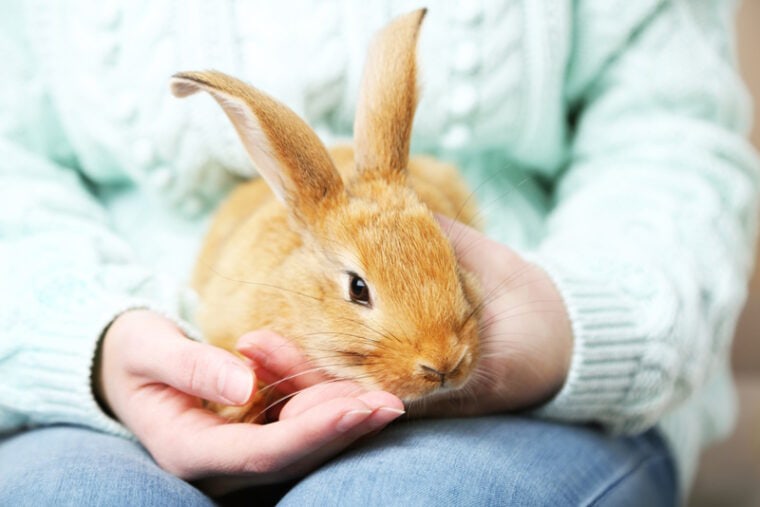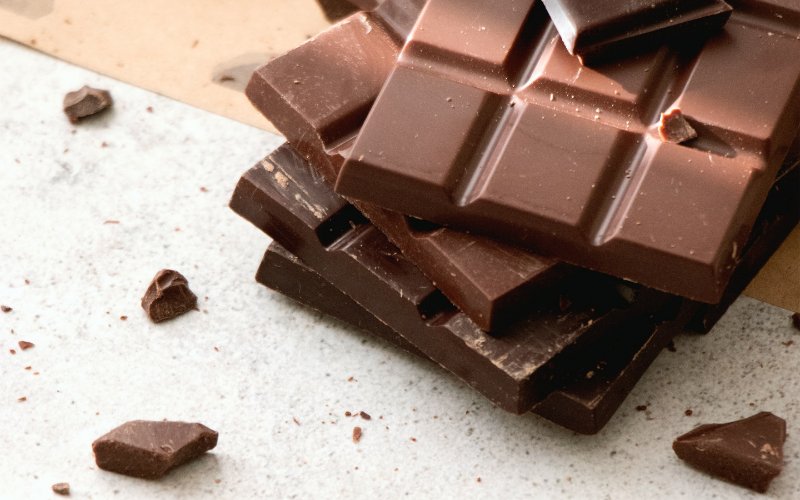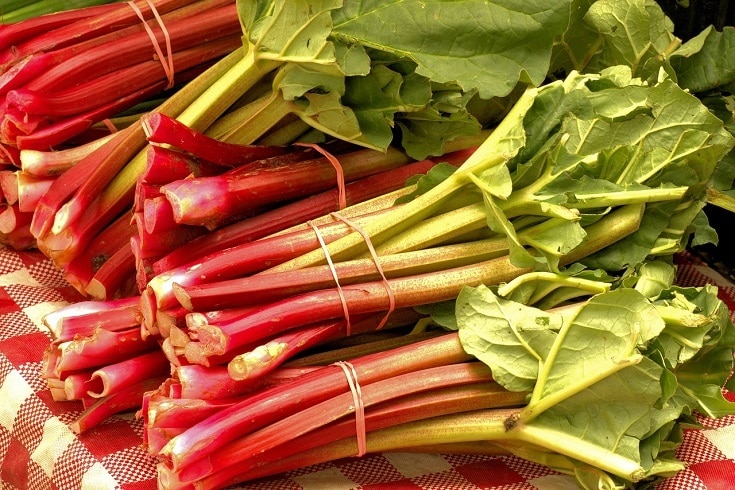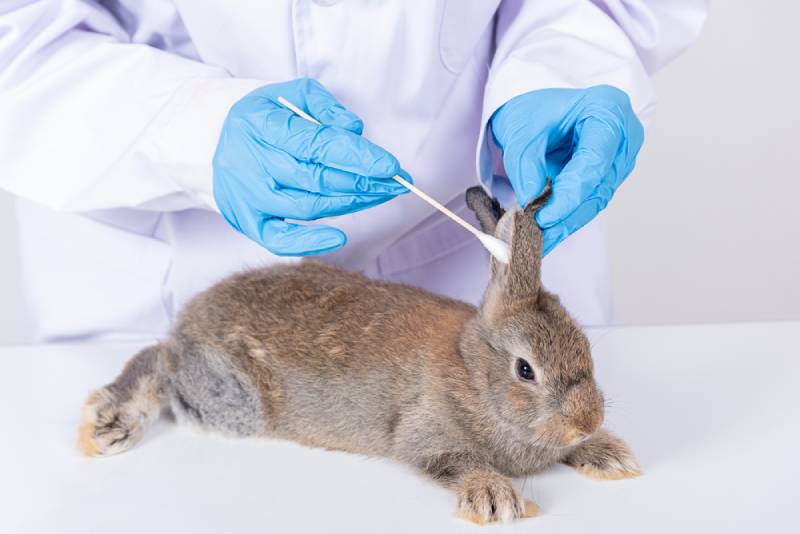
If you have a pet rabbit, you likely know they have an extremely sensitive digestive tract. A little bit of the wrong food can have disastrous consequences for them, which is why it’s essential to research any food you plan on feeding them and consult with your veterinarian.
With that in mind, we’ve highlighted 10 different foods that you should never give to a rabbit. We’ve also highlighted why they’re such a bad idea and given you a general idea of the likelihood that you’ll need to take them to the vet if they get a hold of a little bit of each one!
The 10 Foods That Are Harmful to Rabbits
1. Avocados

| Harmful Component: | Persin |
| Trip to the Vet?: | Yes |
While avocados might seem like a great treat for your rabbit, the truth is that all parts of the avocado, including the leaves, stems, seeds, and flesh, are dangerous and should be avoided at all costs.1 That’s because avocados contain an ingredient called persin, which is toxic to most animals, including rabbits.
Every part of an avocado has persin, so you should avoid feeding it to them in all circumstances. If your rabbit does happen to eat a part of the avocado plant, it’s crucial to contact your vet for prompt advice.
2. Chocolate

| Harmful Component: | Theobromine, caffeine, and sugar |
| Trip to the Vet?: | Yes |
Chocolate contains multiple ingredients that make it an extremely dangerous food for your rabbit. Caffeine can lead to a potentially fatal raised heart rate, while sugar can cause various health problems for your rabbit.
But the most dangerous ingredient in chocolate is also one of the lesser-known ones: theobromine. The darker the chocolate the more theobromine the chocolate has and the more dangerous it is. Chocolate toxicity can quickly prove fatal, so err on the side of caution and get your rabbit treatment immediately if they get into any chocolate.
The research on this topic is scarce, but there are reports of mortality amongst rabbits that had theobromine added to their diet, alongside detrimental effects on their heart, reproductive organs, and thymus gland.
3. Bread, Pasta, or Crackers

| Harmful Component: | Carbohydrates and sugar |
| Trip to the Vet?: | Likely, depending on the amount |
Bread, pasta, and crackers all contain higher levels of carbohydrates and sugar than what’s safe for your rabbit. While a single dried noodle, cracker, or piece of bread shouldn’t kill your rabbit, if you make it a regular part of your rabbit’s diet you’re asking for serious health and digestive problems.
In fact, if it’s a more regular part of your rabbit’s diet, you’re slowly making them more and more ill, even if they seem fine immediately after eating it. Carbs will contribute and directly lead to gut stasis, obesity, and, consequently, dental issues due to lack of fiber in the diet.
4. Rhubarb

| Harmful Component: | Oxalic acid |
| Trip to the Vet?: | Likely, depending on the amount |
Rhubarb is another surprising entry on this list, but it’s certainly something you won’t want to make a part of your rabbit’s diet. That’s because the oxalic acid in rhubarb can interfere with your rabbit’s ability to absorb essential nutrients like calcium.
Small quantities of rhubarb likely won’t require a trip to the vet, but it’s best to play it safe and keep rhubarb out of your rabbit’s diet completely. Signs of rhubarb toxicity and irritation in the rabbit include a swollen and painful mouth, decreased appetite, bloating, abdominal pain, diarrhea, lethargy, and more. All of these require urgent veterinary attention.
5. Raw Alliums

| Harmful Component: | N-propyl disulfide |
| Trip to the Vet?: | Possible |
Alliums are a family that includes onions, garlic, and leeks, and you should speak to your veterinarian before offering any to your rabbit. The concerning ingredient is n-propyl disulfide, which will destroy red blood cells in dogs and cats. However, there is not enough reputable evidence to suggest it has the same effects in rabbits, or that it doesn’t.
Merck Veterinary Manual does mention garlic and onion as a source of carbohydrates when it comes to rabbit nutrition and does not list them as toxic for rabbits. There are research papers on use of Allium plants, extracts, and oils for various purposes in rabbits, such as effects on the immune system, liver, metabolism, and antimicrobial properties. Based on all of this, we recommend you follow your vet’s advice before offering any Allium plants to your rabbit to be safe.
6. Iceberg Lettuce

| Harmful Component: | Lactucarium |
| Trip to the Vet?: | Possible |
While iceberg lettuce might seem like a surprising addition to this list, it’s because iceberg lettuce includes an ingredient called lactucarium. This is really only an issue if your rabbit eats a lot of it, but since iceberg lettuce provides almost no nutritional value, there’s really no reason to give it to your rabbit in the first place!
Instead, choose dark lettuces, like romaine, as these are higher in fiber and they actually provide nutrients that your rabbit will benefit from. Be moderate, as too much lettuce may lead to a digestive upset.
7. Potato Leaves

| Harmful Component: | Alkaloid solanine |
| Trip to the Vet?: | Likely |
While there’s really no good reason to feed your rabbit any potatoes, you’ll want to be especially careful with potato leaves. That’s because while potatoes are hard for a rabbit to digest and provide little nutritional value, all while leading to serious digestive issues, the leaves can be downright poisonous.
8. Meats, Eggs, or Dairy

| Harmful Component: | Fat, low fiber, etc. |
| Trip to the Vet?: | Likely |
Rabbits are herbivores, which means they don’t have the digestive tracts to break down animal products. You’ll likely find it difficult to even convince a rabbit to eat meat, but often, rabbits will eat things like yogurt because of their sweet tooth.
If they do eat animal products, it’s a recipe for serious digestive problems and imbalance in their gut bacteria, which will require veterinary attention.
9. Cauliflower

| Harmful Component: | Raffinose and other oligosaccharides |
| Trip to the Vet?: | Possible |
Cauliflower is another vegetable that’s better off far away from your rabbit. While cauliflower might seem like a great choice since it’s high in fiber, it’s also notoriously gassy. While this isn’t an issue for people, for rabbits, it can cause potentially fatal digestive disorders and bloating.
This is generally only an issue if a rabbit eats large quantities of cauliflower, but because of the potential seriousness of the condition, it’s best not to give them any.
10. Sugary or Processed Foods

| Harmful Component: | Sugar and carbohydrates |
| Trip to the Vet?: | Likely |
Rabbits have a sensitive digestive system and do best on a natural diet of primarily hay and grass, alongside some fresh vegetables. Sugary and processed foods don’t fit that mold. Even if they don’t cause immediate health problems for your rabbit, although they are very likely to, they will over the long run.
However, since heavily processed foods high in sugar can cause so many immediate health problems for rabbits, there’s a good chance you’ll need to take them to a vet even if they only eat a little bit!
Conclusion
If your rabbit does happen to eat any of the foods on our list and you think you might need to take them to the vet, always err on the side of caution. If you suspect something is wrong, there’s a good chance it is, and if you wait too long it might be too late.
While prevention is better than response, if they already ate something they shouldn’t have, all you can do is get them the necessary treatment and then ensure it doesn’t happen again!
Related Read:
Featured Image Credit: Africa Studio, Shutterstock








